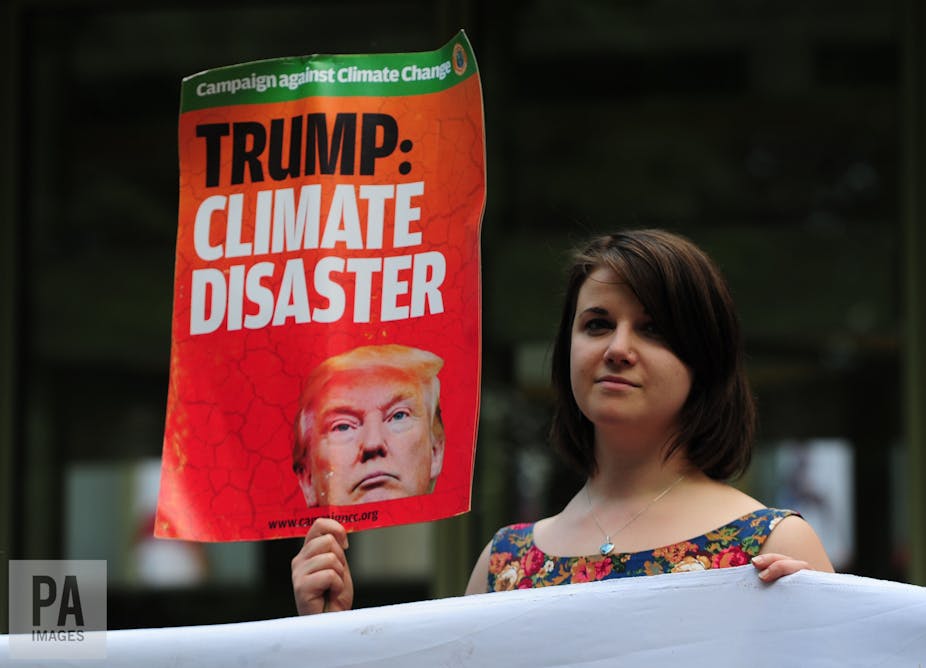Donald Trump’s decision to withdraw from the Paris Agreement is certainly a blow for the global climate regime. But it is primarily a bad deal for the US. It is bad for America’s economy, its global leadership, and its non-climate policy goals. The good news is this: global efforts to tackle climate change will survive without the US.
Though Trump claimed the agreement was “unfair” and against American interests, what he doesn’t realise is that climate policy is good business. Already now, twice as many people are employed in the US renewables industry as are in coal, oil and gas.
The Paris goal of limiting global warming at 2°C also means US$120 trillion will need to go into energy supply, infrastructure and appliances between now and 2050. This is twice the current rate of investment, and the bulk of it will be in low-carbon energy.
Thus far the US has enjoyed an edge in technology, along with many other Western countries. But, given Trump’s opposition to climate action, other nations will now be more hesitant to source from American companies and to engage in joint ventures. This means job losses and possibly even a loss in global technology leadership.
Put differently, climate policy is where the very “tremendous deals” could have been struck that Trump would like to see for US companies, businesses and consumers. Leaving Paris means letting go on these opportunities. Measured by low-carbon patent applications, the EU, Japan and China are well positioned to step in. Jobs that might be “brought back” in the Rust Belt’s heavy industry and mining will not compensate for the opportunities foregone in renewables – the growth area of the future.
No longer a global leader
Trump’s decision is another blow to US soft power. While a mighty war machinery certainly helped America exert global leadership over the past century or so, such “hard power” was always combined with attractive ideas and standards which built momentum for the country’s policies. To be sure, the US refusing to ratify the Kyoto Protocol in 2001 had already dealt a serious blow to its climate leadership. But it was the Obama administration that together with China pushed the subsequent Paris Agreement over the finish line by ratifying it.

With this climate pullout the US is on the verge of saying goodbye to its global leadership based on soft power. What’s left are gunboats and tanks – and an $18 trillion economy the US leadership now thinks about in classic realpolitik terms.
This will clear the way for others to take the lead. China has a strong interest in greening its economy as turns into the world’s prime low-carbon investor. The EU sees an opportunity to advance its position as the globe’s climate champion and to capitalise on its own well-developed low-carbon industry. Both economies – representing roughly US$30 trillion of GDP – have the economic and political clout to push for global change, even in the absence of the US.
Other nations will join in, as they will want to profit from the economic opportunities coming with a transition toward low carbon. India, for instance, the world’s third largest CO₂ emitter, has pledged its commitment to the common agreement and the global governance principles underpinning it.
Climate action is linked to many other policies
Finally, global agreements never live in a policy vacuum. To the contrary, they are always embedded in broader deals that brought them about. Regional or bilateral trade agreements, for instance, are often linked to labour or environmental standards. Now the US has quit Paris, partnering countries might be tempted to retaliate. High level European politicians have already suggested the EU consider restricting market access for American goods, in order to avoid “unfair competition” arising from lower standards in the US.
Links like these mean the US will find it a lot harder to get agreements – or “deals” – done in the future, even if they do not have much to do with environmental protection. Security cooperation comes to mind here, among other, which the current administration cares much about.

What’s the way forward? To be sure, the US quitting Paris does not mean the country returns to the coal-based economy of old. Renewables have reached grid-parity prices in many instances – and low-carbon energy has become a multi-billion dollar industry. Big companies have called for the US to remain in the agreement because of that. Even Texas, the oil-rich Lone Star State, is now a prominent producer of clean energy. Thanks to renewables and a surge in shale gas production, US emissions are now back down to 1992 levels – and Trump will not be able to change that trajectory.
Let’s make no mistake though: the absence of US leadership, policy clout and climate finance will be felt, and the US leaving the Paris Agreement is bad news for the global climate regime. But it is much better than America staying in and pushing for renegotiation of the entire agreement. This would have meant years of deadlock and lingering, with no global action on climate policy.
The beauty of Paris is its bottom-up approach: each signatory sets its own goals, and defines how it goes about meeting them. So the world can move on – even without America.

